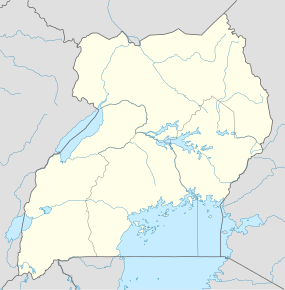Kiryandongo Refugee Settlement
| Kiryandongo Refugee Settlement | |
|---|---|
 Kiryandongo Refugee Settlement | |
| Coordinates: 1°57′25″N 32°10′52″E / 1.957°N 32.181°ECoordinates: 1°57′25″N 32°10′52″E / 1.957°N 32.181°E |
Kiryandongo Refugee Settlement is a refugee camp in central Uganda. It is home to Kenyan and South Sudanese nationals.[1]
History
The Kiryandongo area was first used for resettling refugees in 1954 when the British colonial administration moved Kenyan refugees fleeing the Mau Mau Uprising to Kigumba in what was then Masindi District. During the Idi Amin administration, the land was part of a large-scale government ranching scheme, of which reminders remain today in the names of the subdivisions of the camp. This left the land sparsely populated.[2]
In 1990 the Ugandan government gazetted the virtually uninhabited land around Kiryandongo for refugee resettlement. Ethnic Acholi people fleeing the Sudan People's Liberation Army from Parjok in South Sudan were settled in Kiryandongo after temporarily being held in Kitgum and Masindi. During the 1990s the Sudanese refugees were joined by Ugandan Acholi IDPs from the LRA-affected areas of Gulu and Kitgum[2]
Kiryandongo also served as an interim stop for displaced people transiting to other camps, including 22,000 who moved from the Achol-Pii Refugee Settlement to Kyangwali in 2002.[3]
References
- ↑ Kibego, John (6 August 2014). "Uganda: Kenyan Refugees Demand to Go Home". The Observer. Retrieved 5 December 2014.
- 1 2 Kaiser, Tania (October 2000). "UNHCR's withdrawal from Kiryandongo: anatomy of a handover" (PDF). NEW ISSUES IN REFUGEE RESEARCH. Geneva: UNHCR (32). ISSN 1020-7473. Retrieved 12 June 2016.
- ↑ Mutuli, Milicent (9 September 2002). "Displaced refugees in Uganda start move to permanent site". UNHCR. Retrieved 12 June 2016.